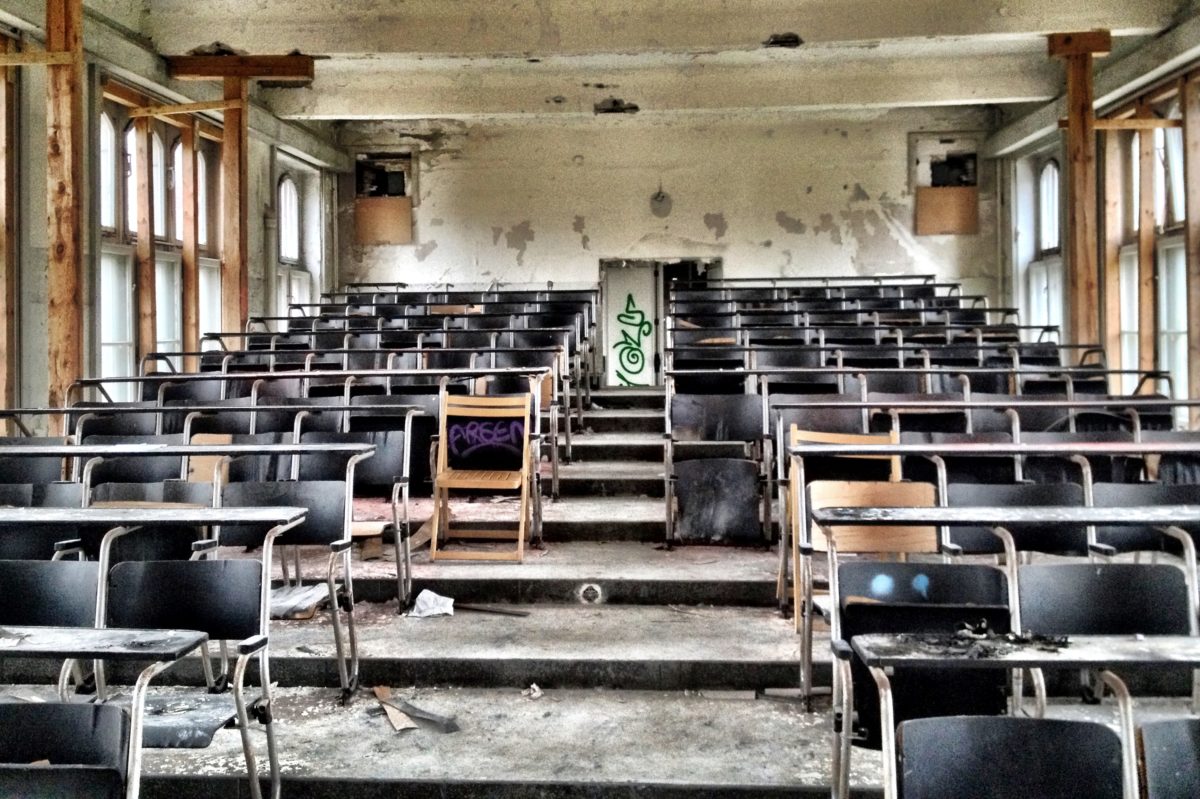How the blind emphasis of higher education is undercutting its value

“I almost feel I’ve been lied to.” That’s how recent college graduate Brittany Dalberg describes her frustration at not finding a desirable job more than a year after receiving her bachelor’s degree in world religion. Her story is a familiar one for many graduates, who resort to living with parents, finding entry-level jobs to pay rent, applying in vain to countless listings, all the while facing looming student debt—in Dalberg’s case, $118,000.
Why “lied to?” Because “our society tells us college is a necessary step; that a whole world of opportunities will open up to us simply because we have a degree.” This is doubtless a widespread belief. From childhood, the importance of college is impressed upon us: our parents set up savings accounts at birth, our teachers stress the value of good grades for college applications, our government siphons billions of taxpayer dollars to subsidize tuition, and our culture insists that a college degree is the gateway to a successful life. These authorities give statistics and arguments to support this claim, many of which are valid: college graduates generally earn higher salaries, experience lower unemployment, attain better health and other social outcomes, and are able to pursue careers grounded predominantly in higher learning.
Yet it’s increasingly clear something is missing from this sacred wisdom. Simply completing four years of courses and obtaining a degree doesn’t often result in easy access to boundless opportunity. Current economic conditions have emphasized this fact, with scores of graduates unable to find the type of jobs they seek, if any job at all. Though today’s economy is an important contributor to the struggles of graduates, the fact remains that even in better times many found themselves second-guessing their college experience and wondering why its ending didn’t match the story they’d always been told.
One might argue that this kind of predicament is a natural result of the naiveté of youth who finally discover what the “real world” is like after leaving the campus bubble. But there’s reason to believe otherwise: there’s something fundamental missing from the college education equation. At the very least, despairing college grads have been misled and misinformed.
Consider first the constant drumbeat by parents, teachers, media, community leaders and even the President about the importance of a college degree. One college advocacy website advises pitching the value of college, not only to students in high school or middle school, but to those in elementary school: “preparation needs to begin all the way down in the primary grades. . . . [K]ids should be guided by teachers and parents to understand the importance of college and to accept it as a real goal that they can fulfill.” Thus, kids find themselves learning about the importance of a distant expectation even while they struggle to learn basic math and the rules of soccer.
The message intensifies in middle school, and by high school, students find that entering college is supposedly the basic goal of their education. Teachers focus on college preparation in their curriculums, “Advanced Placement” classes offer college credit, and counselors encourage students to begin taking college entrance exams as early as freshman year.
Assuming that a young adult does enter college after all (as two thirds do), he likely has no self-developed, independent motivation for having done so. Instead, he finds himself following the path that society has laid before him, completing the “necessary step” in order to receive the promised “world of opportunities.” Indeed, the decision seems so obvious at this point that few bother to think critically and decide for themselves, having begun to agree to the idea before they even had the chance to discover what a college is.
Conventional wisdom says that such uncertainty is to be expected because college is a place for directionless youth to find purpose and learn how to think. Yet evidence shows that alarmingly high proportions of students coast through their coursework without tangible benefit. One recent study by the Social Science Research Council of several thousand students found that barely half improved their critical thinking skills in two years of college, and over a third exhibited no gains after four years. And those are the ones who finish: America has the highest college dropout rate in the world, with half of those who start failing to attain their bachelor’s degree.
Taken together, the picture is distressing: a third-grader instilled with the value of a college education becomes a graduate who is unemployed, underemployed, or unrelatedly-employed with a mountain of debt and a vague sense of being cheated. There are of course many exceptions to this outcome. Some do reach college with purpose and excitement about building the foundation for their chosen career. Others begin aimlessly but find direction along the way. Some find that their degree does directly open up opportunity in their field, and are able to put their new knowledge to use right away (and get paid to do so). But the evidence suggests that such cases are fortunate exceptions to the growing trend of a college system that fails to deliver on its promises.
Consider again the cultural marketing campaign, which claims that if you go to college, you will succeed. If you have a college degree, you will get a good job and be happier and more successful. But there’s a crucial question that’s rarely answered: how? In effect, the answer given is: somehow.
Clearly, as many have learned, it’s not that simple. Yet in effect, the cultural view of college has taken on the quality of a get-rich-quick scheme, an easy ticket to the front of the social and economic line. And like other such schemes, some seem to get rich, so others assume that the scheme works without asking how. Some might be tempted to write off so many cases of waitresses with degrees in world religion or English and say they should’ve known better than to expect a welcoming job market. To the extent such cases involve blithely viewing college as a shortcut, that criticism is warranted.
But more significant than individual mistakes is the broader trend they represent, and the subtle premise underlying that trend. Observe a parallel between the college boom and the housing boom. As we now know, millions of people bought homes they ultimately couldn’t afford. They may have been naïve, but were also following common wisdom, which tells us that owning a home is the hallmark of a successful life, that it’s a universal goal, that the sooner you own one, the better, that it’s a quick and easy means to big financial rewards, and fundamentally, that everyone should rightfully be a homeowner, regardless of individual circumstances. The outcome of that thinking is now evident: many people with title to something below face value, a mountain of debt, and a feeling of being cheated. Sound familiar?
The assumptions inherent in both cases—that there’s a way to shortcut the process, that a college degree or home ownership is the right goal for everyone, that there’s a prescribed path for success in life, and that everyone should legitimately be able to partake, regardless of circumstance—all serve to undercut the crucial value of independence and individualism. College is alleged to be the best thing and the rightful domain of everyone, regardless of their individual attributes. Never mind that many professions are more effectively served by a variety of trade schools. Never mind that countless people go on to become happy and successful without a college degree, or in a field completely unrelated to the one they received. Never mind that a young adult might be better served to work in several fields before finding one that’s actually of interest to him for academic learning. Rather than treating college education as something some people decide to do for particular, individual reasons, we’ve come to treat it as something everyone does, by default, for reasons supposedly self-evident.
What many students confront when college ends is the jarring realization that they’re on their own, and that being proficient on one’s own, i.e. being independent in thought and action, is a far more basic requirement of success than possession of a degree. But independent thought and motivation is undermined at every turn in the college trajectory. Children aren’t offered higher education as something they should independently choose to value and pursue: they are confronted instead with a series of clichés lacking critical assessment of pros and cons. High school students are coached to approach learning not because the courses are personally interesting and significant, but because those courses have currency with anonymous college admissions officers. College students often find little required of them in terms of effort and thought: the inflation of grades and reduction in assigned reading and writing is well-documented. And naturally, graduates find themselves unsure of what they’re supposed to do with the title conferred upon them at the end—and hope that society will take care of the opportunity for them.
Without independent motivation, students can’t learn much if it at all—something echoed in the aforementioned studies. The sheer number of college graduates with four-year degrees is dramatically increasing, rising in a few decades from barely 5% of the population to almost a third. Yet more and more, the graduates are not budding writers, engineers, psychologists, or teachers—they’re people with degrees in writing, engineering, psychology, or teaching hoping for the opportunity to somehow become the real thing.
This is lamentable, not merely for the stories of economic hardship, but because a higher education can be such a tremendous value. That our culture encourages it so blindly is a disservice to all involved, from those misled and destined for failure to those who succeed but without the full benefit they could have received.
This doesn’t have to happen. We can reclaim and realize the full value of higher education if we start with a fundamental reexamination of our cultural approach to college. Teachers should focus on instilling knowledge and independent thought, not tunnel vision towards college entrance. Government should stop pouring billions of taxpayer dollars into the hands of students who aren’t sure why they’re being given the money or what to do with it. Parents should allow their children to develop interests and academic pursuits independently, rather than as a parental mandate. Students, most importantly, should examine their own motivation for pursuing a higher education, think critically about where they want it to take them, and work to integrate that goal with the actual learning in which they are paying to engage.
Taken together, such changes could begin to bring about a shift in the character of higher education: towards students more aware of the nature and purpose of their efforts, more passionate about learning, and better equipped to seek, seize, and create the kind of opportunities they desire.
Noah Stahl received his BS in Computer Engineering and MS in Information Assurance from Iowa State University. He currently works as an information security engineer in Tampa, Florida.




